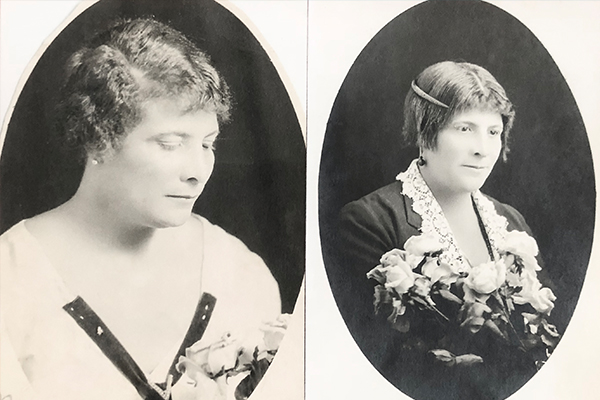
The Making of Gun & Powder
When did you start writing in general? Why does it appeal to you?
ANGELICA: I wrote my first play at the age of 14. I was an actress all throughout junior high school and took my first stab at writing in my 9th grade English class. I was drawn to the platform of writing because it gave me the ability to create an entire universe and then craft a narrative within it. I build a home for myself in each piece I write.
ROSS: Growing up as a die hard theater kid just outside of New York City, musical theater was always an integral part of my life. Seeing Broadway shows as often as I did, even as I was primarily focusing on the actors on stage – since that’s what I wanted to be – I found myself equally obsessed with dissecting the harmonies, dance arrangements, orchestrations, musical themes, and all the other aspects that went into the making of a score. I realize now that these were the elements to which I connected most as a young theatergoer. So when I fell into writing on a whim halfway through my undergraduate musical theater training at Syracuse University, I think I naturally tapped into this whole other pool of musical theater DNA that had been percolating within me for my entire life. At first writing served as a fun platform to showcase the talents of my friends and classmates, but I quickly discovered that writing allowed me to express so many different sides of myself through multiple characters, across an entire evening of storytelling, and this form of self-expression, along with the collaborative nature of theater, has without a doubt been the most fulfilling part of my life. I feel so privileged to get to contribute to the legacy of an art form which has been such a foundational part of my being.
How did you meet and begin to collaborate? What has been the journey of this musical?
BOTH: We met in the NYU Tisch Graduate Musical Theatre Writing Program. When it came time to prep for our thesis year, we went to the Starbucks on Astor Place in NYC to discuss ideas, and the first story Angelica pitched was the tale of the Clarke Sisters. Ross was instantly locked in. The department officially paired us as collaborators, and then we pitched a more fully formed idea to the faculty. They agreed; we had to write this musical. Thus began the journey of us writing Gun & Powder as our NYU thesis and beyond. After our thesis presentation we were awarded a workshop production through the Tisch Center for New Musicals, performed entirely with Tisch Undergrad students. Next came a massive rewrite, and Gun & Powder was selected out of 170 submissions for the SigWorks Lab, right here at the Signature. We then went on to win the Richard Rodgers Award, a second workshop in the Theatre Latté Da NEXT Festival, selected for the NAMT Festival New Musicals and then back home at the Signature for our World Premiere Production.
What is your writing and creative process – especially since you now live on opposite coasts?
BOTH: Writing from opposite coasts definitely has its challenges, but with things like FaceTime and Skype, we’re able to conference with each other quite frequently to discuss ideas, outline, plan and walk through the book. However, we always do our best work when we’re able to be in the same room together, especially when writing songs. Writing retreats have become our new best friend. We’ve been fortunate to have several official retreats via the Johnny Mercer Colony at Goodspeed, the Barnett Residency, Two River Theater and others, but we also readily make our own retreats, racking up frequent flyer miles to hop back and forth between NYC and Los Angeles.

Mary and Martha Clarke
Angelica, family legends about your great-great aunts inspired this piece. Can you tell us a little about the legends? What else inspired and influenced you as you created Gun & Powder?
ANGELICA: The legend of Mary and Martha Clarke started off as a piece of family folklore, all revolving around a pair of portraits. I come from a large African American family with roots in Texas, going back several generations, and many times we’d open the family photo album, turn to the faces of Mary and Martha and immediately ask “Who are these White women?” Then someone would have to clarify that they were in fact Black women and in fact our distant aunts; they just passed for White. But the story never ended there. Tacked onto the history lesson would be a tale of how Mary and Martha robbed a bank, shot and killed an attacker or lived completely innocent lives married to Pullman porters. The story changed each time, which signaled to me that no one really knew what happened with these legendary ladies, so Ross and I took liberties and decided to make up our own version of the truth.
What do you hope the audience takes away from your show?
BOTH: We started writing Gun & Powder right around the time Mike Brown was shot and killed by the police in Ferguson, MO and at that time, we were so eager to finish developing the show and share it with the world because of how relevant it was to the time. Six years later, in arguably the most divided moment our nation has ever seen, it is even more relevant. Truthfully, it has been relevant for over 100 years and will continue to be relevant because of two of the foundational societal constructs on which this nation was built: race and color. We hope that our show would lift the veil on the superficiality of these constructs and help people to recognize the lines are that we’ve drawn to define ourselves. In actuality, we’re much more similar than we are different. Because we’re all just people.